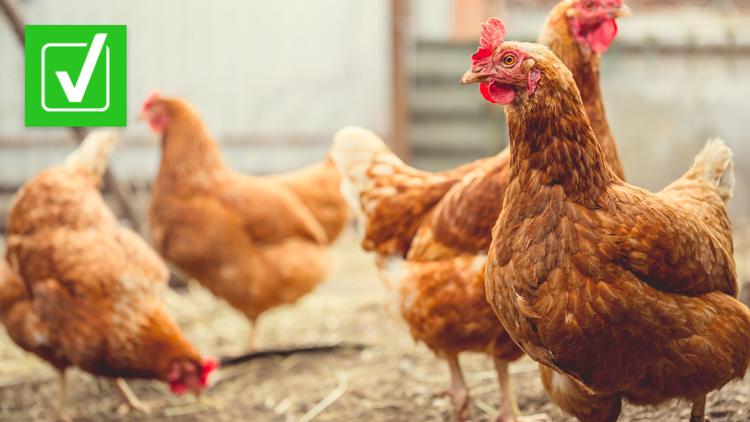Editor's note: On April 1, 2024, the Centers for Disease Control and Prevention announced that a person in Texas is recovering after getting the bird flu. The person was exposed to sickened cows, which are capable of catching the virus. This is the second person ever confirmed to have gotten the virus in the U.S. The CDC says the risk to humans remains low, though people should not consume raw milk and cheese or undercooked eggs. This story continues as originally published in January 2023.
A strain of bird flu that’s very contagious and deadly among chickens has infected birds in nearly every state in the U.S. It’s called highly pathogenic avian influenza (HPAI) A(H5N1).
As of early January 2023, the U.S. Department of Agriculture’s Animal and Plant Health Inspection Service (APHIS) has recorded nearly 58,000 cases in poultry. In late 2021, the virus was detected for the first time in the U.S. since 2016.
According to the Centers for Disease Control and Prevention, HPAI bird flu infections have a 90-100% mortality rate in chickens, affecting multiple internal organs and causing death within 48 hours.
News of the disease prompted increased searches on Google by people wondering if the illness could infect humans.
THE QUESTION
Can the H5N1 strain of bird flu currently spreading in the U.S. infect humans?
THE SOURCES
THE ANSWER
Yes, this bird flu strain can infect humans, but these infections usually only occur when people have close contact with sick birds. It’s rare for the disease to spread from human to human.
WHAT WE FOUND
It’s possible for people who have contact with birds to catch H5N1 bird flu, but such cases are rare and the Centers for Disease Control and Prevention says the disease poses a low risk to the general public.
The CDC reported the first-ever case of a person with H5N1 in the U.S. in April 2022. The infected person worked closely with sick birds as part of depopulation efforts and recovered after a few days, the CDC said. The World Health Organization reported three other cases worldwide in 2022, one of which resulted in a death in China.
People who don’t directly interact with birds are unlikely to catch the virus and properly cooked poultry is still safe to eat, the CDC said.
The virus can be spread from birds to humans through contact with an infected animal’s saliva, mucus and feces, so those most at risk are people like farmers, poultry workers, hunters who may be exposed to sick animals, or people who have backyard chickens.
Since the virus was identified in the U.S. in late 2021, the CDC said such “sporadic” infections in humans would “not be surprising” since cases have been reported in other countries. However, an infected person is unlikely to spread the illness to another person, the agency said.
“Spread of earlier H5N1 viruses from one infected person to a close contact in the past have happened very rarely and have not led to sustained person-to-person spread,” the CDC said in an April statement about the U.S. case.
The WHO echoed guidance about the current strain’s lack of transmissibility among humans, but warned about future mutations.
“While recently-identified avian influenza viruses do not currently transmit easily from person to person, the ongoing circulation of these viruses in poultry is concerning, as these viruses cause severe disease in humans and have the potential to mutate to become more contagious between people,” the WHO said.
While cases in humans are rare, they can be deadly. Since 2003, the WHO collected data from more than 868 human infections occurring in 21 different countries. About 53 percent of infected people died from the illness.
The CDC recommends taking some of the following precautions when dealing with live poultry:
- Wash your hands after collecting eggs, handling birds or being in their living spaces
- Adults should supervise children as they wash their hands
- Use hand sanitizer after any contact with birds if soap and water aren’t readily available
- Don’t kiss birds or bring them close to your mouth
- Don’t bring birds into human living spaces
- Avoid getting scratched or bitten by birds
If a person does become infected with HPAI A(H5N1), antiviral medication may help treat the illness, which causes flu-like symptoms including cough and fever, according to the WHO. The CDC also says it has the blueprint for a vaccine that could protect people if the virus started spreading more widely from human to human.
Experts urge livestock farmers and backyard birders to take steps to protect their animals. Signs bird flu is spreading among backyard poultry include fewer eggs and frequent deaths, the CDC says. The Animal and Plant Health Inspection Service has resources available through its “defend the flock” program.
“The main action right now is for anyone who owns birds to take steps to help protect the health of their birds. More information on how to do that is available on our website,” a USDA spokesperson told VERIFY.



